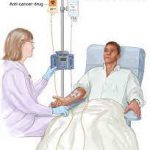The basics
Epirubicin (brand name- Ellence) is an FDA-approved treatment used in combination with other medications for breast cancer in women who have had surgery to remove the tumor.
Epirubicin is in a class of medications called anthracyclines. It works by slowing or stopping the growth of cancer cells in your body.
Let us walk you through they key things you need to know about epirubicin.
Make sure you go through IMPORTANT WARNING section at the end of this article.
How should I take epirubicin (Ellence)?

Epirubicin comes as a solution (liquid) to be injected intravenously (into a vein) by a doctor or nurse in a medical facility along with other chemotherapy medications.
Ask your pharmacist or doctor for a copy of the manufacturer’s information for the patient.
Do not stop taking treatment without talking to your doctor. You can help them by tracking your side effects in Ankr.
What are the side effects of epirubicin (Ellence)?
Common side effects
- nausea
- vomiting
- sores in the mouth and throat
- stomach pain
- diarrhea
- loss of appetite or weight
- unusual tiredness or weakness
- hair loss
- hot flashes
- darkening of the skin or nails
- pale skin
- rash
- hives
- itching
Serious side effects
- red discoloration of urine (for 1 to 2 days after dose)
- sore or red eyes
- eye pain
- fainting
- dizziness
- difficulty breathing or swallowing
Epirubicin may cause other side effects. Call your doctor if you have any unusual problems while taking this medication.
If you experience a serious side effect, you or your doctor may send a report to the Food and Drug Administration’s (FDA) MedWatch Adverse Event Reporting program online or by phone (1-800-332-1088).
Use the free Ankr platform or Ankr app to track your symptoms.
What special precautions should I follow?
Before receiving epirubicin injection (Ellence)
- tell your doctor about your allergies
- tell your doctor about other intakes
- tell your doctor if you have or have ever had any other disease, symptom, or treatment
- Women who are pregnant or breast-feeding should tell their doctors before they begin receiving this drug. You should not become pregnant or breast-feed while you are receiving epirubicin injection.
While you are on epirubicin injection (Ellence)
- If you become pregnant while receiving epirubicin, call your doctor. Talk to your doctor about birth control methods to use during your treatment. Epirubicin may harm the fetus.
- do not have any vaccinations without talking to your doctor.
In case of an emergency/overdose
In case of overdose, call the poison control helpline at 1-800-222-1222. Information is also available online at https://www.poisonhelp.org/help. If the victim has collapsed, had a seizure, has trouble breathing, or can’t be awakened, immediately call emergency services at 911.
Symptoms of overdose may include the following:
- sores in the mouth and throat
- fever, sore throat, chills, or other signs of infection
- unusual bleeding or bruising
- black and tarry stools
- red blood in stools
- bloody vomit
- vomited material that looks like coffee grounds
What special dietary instructions should I follow?
Unless your doctor tells you otherwise, continue your normal diet.
Brand names
- Ellence®
Last Revised – 06/11/2023, FDA updated-03/15/2012, SG
Epirubicin should be administered only into a vein. However, it may leak into surrounding tissue causing severe irritation or damage. Your doctor or nurse will monitor your administration site for this reaction. If you experience any of the following symptoms, call your doctor immediately: pain, itching, redness, swelling, blisters, or sores in the place where the medication was injected.
Other complications
Epirubicin may cause serious or life-threatening heart problems at any time during your treatment or months to years after your treatment has ended. Your doctor will order tests before and during your treatment to see if your heart is working well enough for you to safely receive epirubicin. These tests may include an electrocardiogram (ECG; test that records the electrical activity of the heart) and an echocardiogram (test that uses sound waves to measure your heart’s ability to pump blood). Your doctor may tell you that you should not receive this medication if the tests show your heart’s ability to pump blood has decreased.
Tell your doctor if you have or have ever had any type of heart disease or radiation (x-ray) therapy to the chest area.
Tell your doctor and pharmacist if you are taking or have ever received certain cancer chemotherapy medications such as daunorubicin (Cerubidine), doxorubicin (Doxil), idarubicin (Idamycin), mitoxantrone (Novantrone), cyclophosphamide (Cytoxan), or trastuzumab (Herceptin). If you experience any of the following symptoms, call your doctor immediately: shortness of breath; difficulty breathing; swelling of the hands, feet, ankles or lower legs; or fast, irregular, or pounding heartbeat.
Epirubicin may increase your risk for developing leukemia (cancer of the white blood cells), especially when it is given in high doses or together with certain other chemotherapy medications.
Epirubicin can cause a severe decrease in the number of blood cells in your bone marrow. This may cause certain symptoms and may increase the risk that you will develop a serious infection or bleeding. If you experience any of the following symptoms, call your doctor immediately: fever, sore throat, ongoing cough and congestion, or other signs of infection; unusual bleeding or bruising.
Epirubicin should be given only under the supervision of a doctor with experience in the use of chemotherapy medications.
Talk to your doctor about the risk(s) of receiving epirubicin.
Get 24×7 support epirubicin (Ellence)
Don’t go through your cancer journey alone. Use Ankr to:
(1) find the best treatment for your cancer, and
(2) get advanced warning to cut side effects by upto 52%
